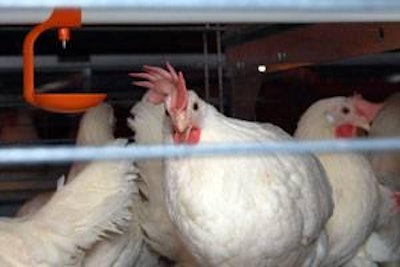
Members of the United Egg Producers gathered in Washington, D.C., in early May for the cooperative’s annual legislative meeting, and with H.R. 3798—the laying hen welfare bill—introduced in the House of Representatives, there has never been a more important time for egg farmers to speak with their representatives in Congress, according to David Lathem, president and CEO of Lathem Farms.
Lathem, who is also the chairman of the United Egg Producers, stated, “I believe that this legislation is vital to the success of our family farms. Yes it will mean significant changes and a large capital commitment from each of our companies, but this will give us a clear path, a level playing field and a reasonable time period to achieve our goals. If we want this bill to pass then we must now let our voices be heard by our congressmen. Now is the time to let our voices be heard, and by being united I know that we will be successful.”
Mainstream media support
Long-time lobbyist for the United Egg Producers, Mike McLeod, said, “It is just a matter of time before we succeed on our legislation. There is almost unanimous support in the media.” The favorable coverage in the media includes both national and regional publications. Speaking to United Egg Producers members prior to their visits to Capitol Hill, McLeod stated, “When I talk to people outside of our little world of production agriculture, the support (for H.R. 3798) has been overwhelming. It is just a matter of us sticking with it and doing the things that we need to do and this includes the visits that you will make this week.”
“I think that we are going to win, if not this year it will only be because we don’t have a farm bill,” McLeod continued. “If not, we will just stick with it and come back next year. We know that we will win because it is the only reasonable thing that we can do to protect the future of our industry.”
Not setting a precedent
The United Egg Producers’ other long-time lobbyist, Randy Green, said that he was “more optimistic than in the past” regarding the prospects for passage of H.R. 3798. He stated that the biggest single objection to the bill that they are hearing is that “this sets a precedent that will come back to haunt the rest of animal agriculture.” Green then explained how he attempts to counter this objection to H.R. 3798: “We say no for two reasons. First, the only reason we are having this conversation about legislation is because producers of eggs want it. The Humane Society of the United States wouldn’t get to first base with the members of the Senate or House Agriculture committees if egg producers didn’t want it. Second, eggs have always been regulated differently than other agricultural commodities. The U.S. Food and Drug Administration has on-farm inspections of egg production facilities and not for beef and pork producers. Packers and Stockyards legislation covers beef and pork production but not eggs. There have been price supports for dairy since 1949, but there aren’t any for eggs.”
Green continued, “Congress should be smart enough to judge this on the merits and not overblown fears about the precedent that could be set.”
HSUS resources put to work
Green and McLeod credited much of the support for H.R. 3798 among house members in urban districts to the lobbying efforts of the Humane Society of the United States. With its large financial resources and lobbying staff, the Humane Society of the United States booked more congressional visits than Green and McLeod could attend, so they recruited Dr. Stephanie Mercier, who had previously worked on Capitol Hill, to help represent the United Egg Producers at some meetings.
AVMA endorsement
A number of public opinion polls show a high level of support for H.R. 3798 among members of the general public. Gene Gregory, president of the United Egg Producers, said that one reason that there is so much support for H.R. 3798 among members of congress and the general public is that the American Veterinary Medical Association has come out in favor of the legislation. He explained that getting support from the American Veterinary Medical Association is a “big deal, it carries a lot of weight with many people, including members of Congress” and that “it shocked the world that we could get that done.”
“I am a lot more optimistic now than when we started this long slog. I was never under any illusion that this would be easy, but as we keep working, it gets to feel more and more inevitable, because of the support we get from anyone who is not from within the narrow ranks of production agriculture,” stated McLeod.
Strong public support
“We get a very good reception from the Congress at large and from the press of all stripes. We will win, because the public is in support of the position we have,” McLeod said. It is important for members of Congress to hear from egg producers directly so that they can put a human face on this, according to McLeod.
As of April 25, H.R. 3798 had 58 cosponsors, but a companion bill had not been introduced in the Senate as of the United Egg Producers May meeting. Senator Dianne Feinstein from California has agreed to be an original sponsor of the legislation in the Senate, but other cosponsors had not signed on yet. In spite of this, when asked about prospects for passage of the bill as of May 8, 2012, Mike McLeod had this answer: “If it was voted on the house floor today, we would win,” he said.


















